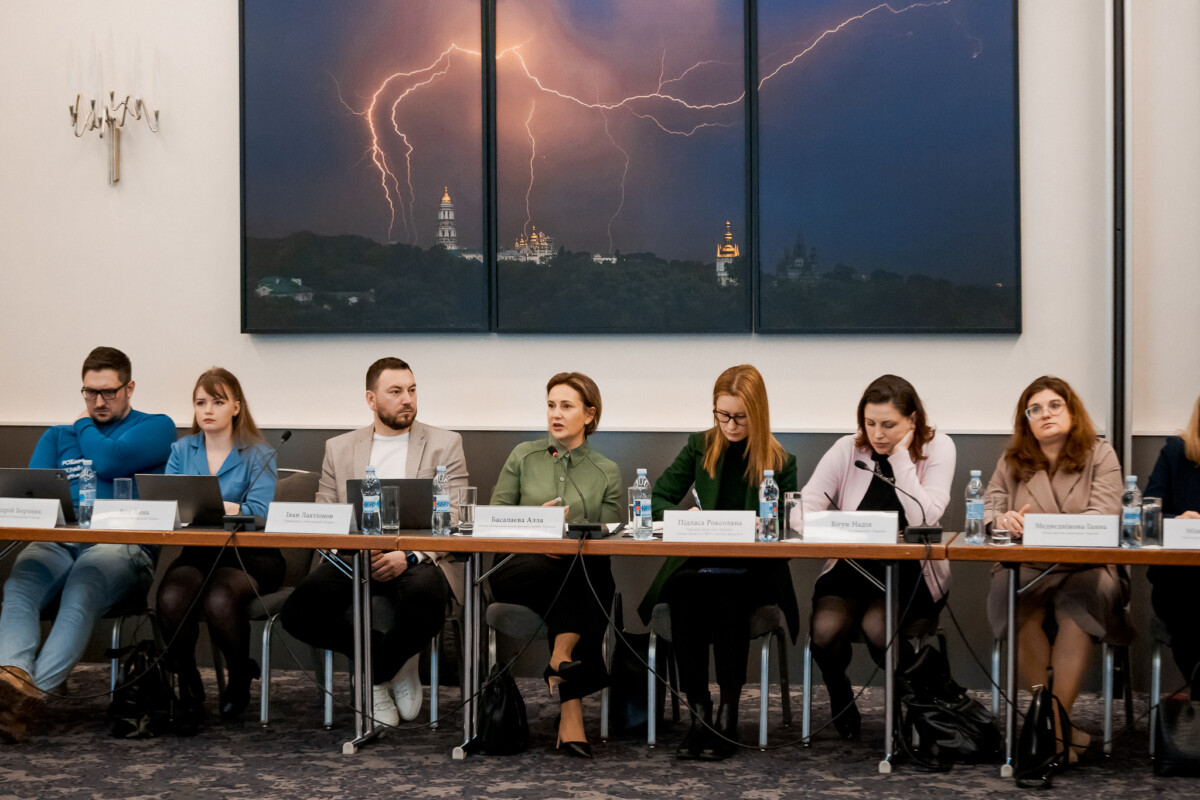

On April 20, as part of the European Union project “Civil Society for Ukraine’s Post-war Recovery and EU-Readiness,” funded by the European Union, Transparency International Ukraine, together with key stakeholders, held a roundtable “Procurement Monitoring: What Needs to Be Changed?”
The purpose of the event was to outline the state of the control system in the field of public procurement, to exchange opinions on the necessary legislative amendments, and to agree on further steps to improve this system.
“In the situation when the state budget deficit reaches USD 42 billion, and half of our budget is financed by international partners, we cannot afford for public procurement to be ineffective. Therefore, the role of control will be growing steadily. This is not just about punishment — this is about improving the entire spending system. We hope that the state auditors will cope with this challenge, and we are ready to help them,” said Roksolana Pidlasa, Head of the Budget Committee of the Verkhovna Rada.
“Our present dictates a conscious change of approach to public spending, which is impossible without quality financial oversight by the state. We all understand that procurement is the most vulnerable link for fraud, conflict of interests, collusion of procuring entities and participants, and other violations of legislation. As required by Ukraine’s international commitments, the State Audit Service is designated as the agency responsible for ensuring the verification of the use of funds allocated for the reconstruction and implementation of individual projects (in particular, project costs, results, and accomplishments). These are the funds of our partners and donors, so the attention of the state financial control will be even more focused on compliance with the principles of legality, efficiency, and economy during the implementation of reconstruction projects,” emphasized Alla Basalayeva, Head of the State Audit Service.
One of the problems is that it is difficult for auditors to hold perpetrators accountable. Therefore, they want to get access to violators’ personal data. In addition, auditors propose the option of stopping payments under contracts concluded with significant violations. Not all participants supported this idea.
Some of the other speakers suggested changing the approaches to oversight rather than ramping up sanctions for violations.
“We analyzed the most common types of violations that auditors find as a result of monitoring. The top 10, covering over 90% of all findings, are insignificant. For the most part, they do not concern the substantial part of procurement and do not cause possible economic losses to the state; they are rather about the form — that is, violations in the procedural part, deadlines for publication, untimely answers to questions, forms of documents, etc. Therefore, we really support developing control in the vector of identification and prevention of significant violations linked to the state’s economic interests.
On the other hand, this process must be comprehensive. That is, in order to work with monitoring effectively and prevent economic losses, the focus in oversight must shift from form to substance. This will be a signal for procurement specialists to also change the focus of their work and pay more attention to market analysis, competition, the best prices and offers,” said Nadiia Bihun, Deputy Minister of Economy.
All roundtable participants agreed that the State Audit Service should be more than just a punitive body. Its main goal is to help the state use funds efficiently. Therefore, control, including monitoring, requires change in several directions:
- strengthening responsibility for violations, in particular, expanding the powers of auditors to bring perpetrators to liability;
- revision of monitoring approaches and methodology.
“It is impossible to resolve all problems with public procurement oversight that accumulated over years in just a few hours. But it is critical for us to discuss potential changes with all stakeholders, exchange thoughts and ideas. This is the only way to create lasting change that will really work for the benefit of the system, and not just complicate it. Therefore, I am confident that this meeting will be a good start to this process,” said Deputy Executive Director for Innovative Projects of TI Ukraine Ivan Lakhtionov.
Further, Transparency International Ukraine , in cooperation with the other participants, will work on developing a draft law to improve the oversight system. In addition, risk indicators require special attention — their full launch and improvement will allow automatic recording of suspicious terms and speed up the detection of risky tenders.
The event was held within the project “Civil Society for Ukraine’s Post-war Recovery and EU-Readiness” funded by the European Union.
For reference:
The project “Civil Society for Ukraine’s Post-War Recovery and EU-Readiness” is being implemented by an association of well-known Ukrainian CSOs and think tanks:
- The Agency for Legislative Initiatives is a think tank with many years of expertise in democratization, parliamentarism, political education, and good governance.
- Transparency International Ukraine – is an accredited chapter of the global movement Transparency International, with a comprehensive approach to development and implementation of changes for reduction of the corruption levels in Ukraine.
- Civil Network OPORA is a non-governmental all-Ukrainian organization of public control and support in the field of elections, parliamentarism, education, joint ownership, energy efficiency, local self-government, as well as the comprehensive implementation of the principle of open data.
- Tomorrow’s lawyer is a non-governmental organization with practical experience in the field of legal and judicial development, reforming the justice sector.
- The Centre for Economic Strategy is a non-governmental research body on economic policy issues.
- NGO European Pravda is an independent Ukrainian media that specializes in covering news on European issues and European integration of Ukraine.
More information about the project: https://parlament.org.ua/2022/09/19/ali-eu-readiness-consortium/.
For more information, please contact Valeriia Zalievska, Communications Manager at Transparency International Ukraine, [email protected], +38(050) 521-16-64.










